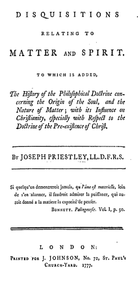
Disquisitions relating to Matter and Spirit
Encyclopedia

Metaphysics
Metaphysics is a branch of philosophy concerned with explaining the fundamental nature of being and the world, although the term is not easily defined. Traditionally, metaphysics attempts to answer two basic questions in the broadest possible terms:...
written by eighteenth-century British polymath
Polymath
A polymath is a person whose expertise spans a significant number of different subject areas. In less formal terms, a polymath may simply be someone who is very knowledgeable...
Joseph Priestley
Joseph Priestley
Joseph Priestley, FRS was an 18th-century English theologian, Dissenting clergyman, natural philosopher, chemist, educator, and political theorist who published over 150 works...
and published by Joseph Johnson
Joseph Johnson (publisher)
Joseph Johnson was an influential 18th-century London bookseller and publisher. His publications covered a wide variety of genres and a broad spectrum of opinions on important issues...
.
Between 1774 and 1778, while he was serving as an assistant to Lord Shelburne
William Petty, 2nd Earl of Shelburne
William Petty-FitzMaurice, 1st Marquess of Lansdowne, KG, PC , known as The Earl of Shelburne between 1761 and 1784, by which title he is generally known to history, was an Irish-born British Whig statesman who was the first Home Secretary in 1782 and then Prime Minister 1782–1783 during the final...
, Priestley wrote five major metaphysical works, in which he outlined his materialist philosophy, even though such a position "entailed denial of free will and the soul."
In the first of these works, The Examination of Dr. Reid's Inquiry. . . Dr. Beattie's Essay. . . and Dr. Oswald's Appeal (1774), Priestley had strongly suggested that there was no mind-body duality
Dualism (philosophy of mind)
In philosophy of mind, dualism is a set of views about the relationship between mind and matter, which begins with the claim that mental phenomena are, in some respects, non-physical....
. Such a position shocked and angered many of his readers who believed that such a duality was necessary for the soul
Soul
A soul in certain spiritual, philosophical, and psychological traditions is the incorporeal essence of a person or living thing or object. Many philosophical and spiritual systems teach that humans have souls, and others teach that all living things and even inanimate objects have souls. The...
to exist. In order to explain his belief more clearly Priestley wrote the Disquisitions, which claimed that both "matter" and "force" are active, and therefore that objects in the world and the mind must be made of the same substance. Moreover, he contended that discussing the soul was impossible because it is made of a divine substance, and humanity cannot access the divine. He therefore denied the materialism of the soul while simultaneously claiming its existence. Although he buttressed his arguments with familiar scholarship and ancient authorities, including scripture, he was labeled an atheist and at least a dozen hostile refutations of the work were published by 1782.

